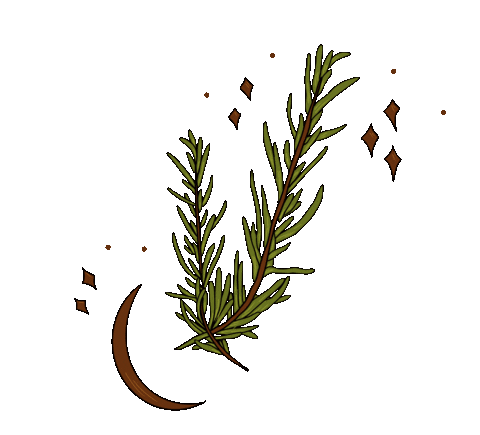by Lyssa Delgado

Welcome to my new weekly article, The Heretic's Herbiary! In this weekly article, I will be discussing different herbs and plants and their connections to witchcraft through different cultural histories. While I will be taking requests for herbs to cover, this week will be my choice: rosemary!
How many of use have heard of the term "sageing" or "smudging" with sage? While this is actually a protected Native American ritual often appropriated by other cultures, the use of rosemary has been popular in open cultures of Europe for hundreds of years! Roman priests used rosemary as incense in religious ceremonies, and many cultures considered it a herb to use as protection from evil spirits, demons, and witches. In England, it was burned in the homes of those who had died from illness, and placed on coffins before the grave was filled with dirt.
Rosemary was well known to ancient practitioners of magic for many things! It was an herb known for strengthening the memory and helping the brain. Eventually, it also became associated with the fidelity of lovers, and was presented to wedding guests as a gift in the form of a wreath or bouquet or even live plant!
Rosemary, sometimes known as compass weed or polar plant, was often cultivated in kitchen gardens, and was said to represent the dominance of the lady of the house. This woody plant was also known to provide delicious flavoring for game and poultry. Later, it was used in wine and cordials, and even as a Christmas decoration, as it is technically an evergreen relative! Interestingly, for an herb plant, rosemary is surprisingly hardy. If you live in a climate with harsh winters, dig up your rosemary each year, and then put it in a pot and bring it inside for the winter. You can re-plant it outside after the spring thaw!
Some Christian folklore claims that rosemary can live up to thirty-three years. The plant is associated with Jesus and his mother Mary in some tales, and Jesus was approximately thirty-three at the time of his death by crucifixion. Rosemary is also associated with the Greek goddess Aphrodite–-Greek artwork depicting this goddess of love sometimes includes images of a plant believed to be rosemary.
For magical use, burn rosemary to rid a home of negative energy, or as an incense while you meditate. Hang bundles on your front door to keep harmful people, like burglars, from entering. Stuff a healing poppet with dried rosemary to take advantage of its medicinal properties, or mix with juniper berries and burn in a sickroom to promote healthy recovery. In spellwork, rosemary can be used as a substitute for other herbs such as frankincense, much like a white candle can be used as a substitute in most candlework spells.
The essential oil of the rosemary plant is great for cleansing your magical tools, such as athames and wands. If you don't have any rosemary oil lying around, don't worry. Get some fresh stalks, and crush the leaves in a mortar and pestle to release the oils and fragrance; rub the crushed leaves on your tools.
Overall, rosemary is a great magical ingredient to have around--and even if you don't believe in magic, it's hearty, smells great, and brings out the flavors of many amazing foods!
That's it for this week's Heretic's Herbiary! Remember to comment with an herd or plant you'd like to see in the article next time! Have a magical day!

Contact
Site Jobs
Code by Bah